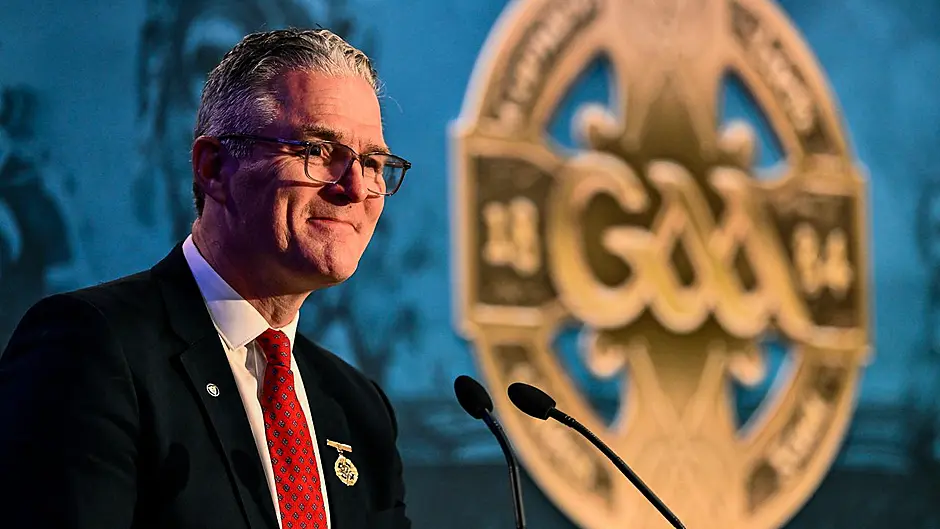BY TOM LYONS
THE GAA Congress in Newry almost passed by unnoticed. Maybe the fact that only 26 motions were on the clár, the lowest number for many years, was partly responsible but it could also have been the calm before the storm as next year, 2025, will be the year in which rule changes in football and hurling will be entertained.
The highlight of congress was the inauguration of new president, Jarlath Burns, of South Armagh, replacing New York’s Larry McCarthy. Much is expected of Burns in his new position and he wasted no time in laying out his platform for his term in office. There are four main areas to his programme, all of major importance at the present time.
First up is his intention to make Gaelic football a much more entertaining and enjoyable game to watch, an ambition that will be warmly applauded by all GAA people but which has proved beyond the capabilities of many experienced experts. His first step was to set up a Football Review Committee and most encouraging was his appointment of legendary Dublin manager Jim Gavin as chairperson. The progress and recommendations of this new committee will be eagerly awaited, especially for next year’s rules-changing congress.
Secondly, Burns has committed to really driving forward the move for integration of the GAA with the Camogie Association and the LGFA, which is due for completion in 2027. While much of the groundwork has already been done for the integration, there are still many minefields to be negotiated before it becomes a reality at county and club levels.
Thirdly, Burns intends setting in place a new initiative to develop hurling, to be called Tiomáint. This will be in tandem with the committee that already exists to develop hurling. As an Armagh man and an inter-county footballer, never having played hurling himself, there were fears that Burns would prioritise football to the detriment of hurling but he has stressed his love for hurling and made sure his sons play the game, at club and intercounty.
Fourthly, Burns is extremely worried about the growing costs of preparing intercounty teams, over 40 million being spent last year by county boards. This is becoming a huge burden on counties, especially smaller counties, and Burns is determined to reverse the trend. To do so, the association must look at the amateur status of the GAA and with that in mind, he has set up an Amateur Status Committee to examine the situation and bring forward recommendations.
Of the 26 motions discussed at congress only a small handful will have any effect at club level. Cork’s motion that U20 county footballers and hurlers should be allowed to play U20 and senior within 60 hours of each other was passed. The rule as it stood had seven days between the grades and applied only to Tier 1 in hurling and Tiers 1 and 2 in football. The new rule, which will come into force in 2025, will apply to all tiers.
An injured player who discards his helmet must now be taken off the pitch for a head injury assessment. It was becoming a growing practice that players who suffered any injury on the pitch would immediately take off the helmet to stop play and this was also becoming a tactic to halt an opposing team’s momentum. Now the player must be taken off the pitch, with the game continuing. An injured player must leave the pitch at the nearest point on the sideline, but if returning, must come in at a central point, with the referee’s permission and at a break in play only.
There shall be no appeal by a club at the appointment of a referee by the CCC. Up to now this applied only at national level but will apply at county board and divisional CCC levels in future. This rule is a consequence of the controversy in Down last season when there was an objection to the referee appointed for the county final.
In future all cards, black, yellow and red, accrued during normal time in a game, will carry over into extra time. Up to now only black cards carried over and if a player received a red card in normal time, he could be replaced in extra time, bringing the team back up to 15. Now the team will play extra time with fourteen. Also, in the past, if a player received a yellow card in normal time, it did not carry over to extra time and he would have to receive two more yellows before being shown red. Now, the yellow card will carry over and one more yellow will result in red and dismissal.
People who use abusive language to a match official will now receive a two-match ban, doubling the present penalty; this will be welcomed by all referees. Also, girls will be officially allowed to play up to U12 with mixed teams. Tracey Kennedy, former Cork chairperson, was elected as the first ever female Representative of Congress when she defeated New York’s Joan Henchy by 140 votes to 125.








